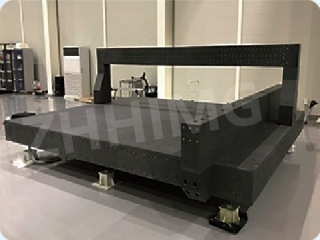In the world of quality control and precision measurement, the Coordinate Measuring Machine (CMM) is one of the most important tools. This advanced measuring device is used in various industries, including aerospace, automotive, medical, and manufacturing, to ensure precision in product measurement, quality control, and inspection. The accuracy of the CMM depends not only on the machine's design and technology but also on the quality of the materials used in its construction. One such key material used in CMM is granite.
Granite is one of the most common materials used in the construction of CMMs because of its unique properties that make it an ideal material for machine beds, spindle, and workbench components. Granite is a naturally occurring stone that is very dense, hard, and stable. These properties make it an ideal material for providing outstanding damping and thermal stability in CMM.
The choice of granite as the primary material for CMM is not just a random decision. The material was chosen because of its excellent mechanical properties, including high stiffness, high modulus of elasticity, low thermal expansion, and high degree of vibration absorption, thus ensuring a high degree of accuracy and repeatability in measurements.
Granite has a low coefficient of thermal expansion, which means that it can withstand high temperature fluctuations and maintain its dimensional stability. This property is crucial in a CMM as the machine must maintain its flatness and stability even when exposed to temperature changes. The thermal stability of granite, combined with its ability to absorb vibrations and reduce noise, makes it an ideal material for the workbench, spindle, and base.
Additionally, granite is also non-magnetic and has good corrosion resistance, making it an excellent choice, especially in the manufacturing industry where the measurement of metallic parts is common. The non-magnetic property of granite ensures that it does not interfere with measurements done using electronic probes, which could cause errors in the readings.
Furthermore, granite is easy to clean and maintain, making it a reliable material choice. It is also long-lasting and durable, which means that it provides a longer machine life, reducing the cost of replacement and maintenance.
In summary, the choice of granite as the spindle and workbench material for CMM is based on its excellent mechanical and thermal properties. These properties enable the CMM to provide precise and accurate measurements, maintain dimensional stability, and absorb vibrations and noise, among other advantages. The superior performance and extended life of a CMM constructed with granite components make it an excellent investment for any industry or organization that requires high-quality measurement and quality control.
Post time: Apr-09-2024

